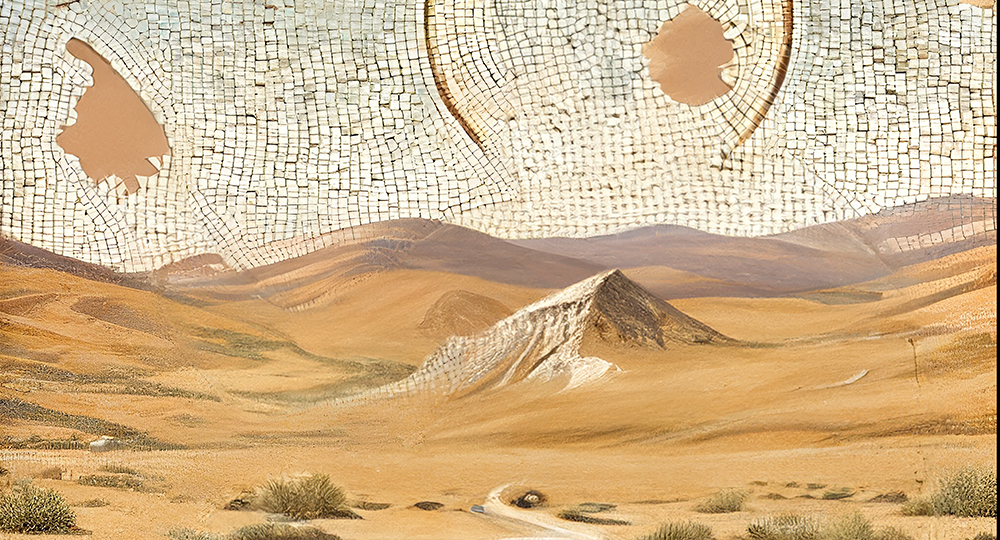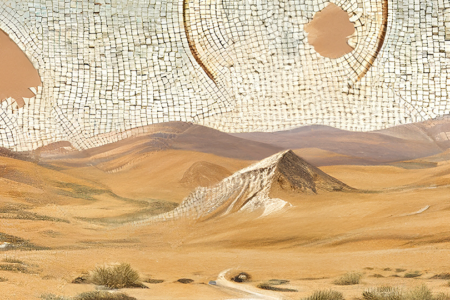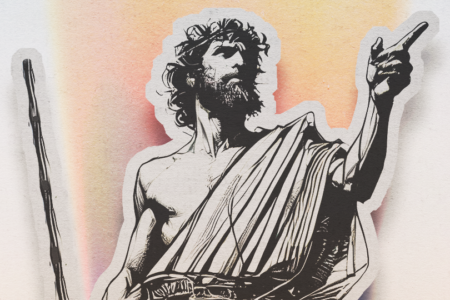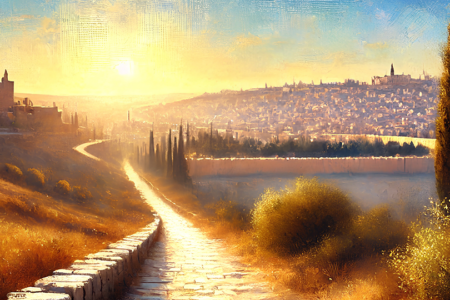John the Baptist: His Purpose and Passion
Commitment. Zeal. Fire. Like Elijah, John had them all. And he demonstrated them with one goal in mind: to prepare the Jewish people for the coming of their Messiah.
In 1906, a new land-speed record of 127 miles per hour was set by Fred Marriott on Ormond Beach in Daytona, Florida. He drove what was known as the “Stanley Rocket,” a steam-powered car. Though steam cars had been around for more than a hundred years, the Stanley Rocket was the fastest, greatest steam car ever created.
However, as great as it was, it couldn’t compete with the new gasoline-powered internal combustion engines being developed.
John the Baptist’s place in history is somewhat similar to the Stanley Rocket’s. Jesus called John the greatest person ever to have been born of a woman (Mt. 11:11). A prophet in the mold of Elisha, Isaiah, and Jeremiah, John was the ultimate example of what following God looked like under the Old Testament Law. His birth and ministry even fulfilled prophecy.
Yet, Jesus also said that every person in His Kingdom would be greater than John. God’s work in His people under the Old Covenant reached its apex in John the Baptist. But a new engine was about to start driving God’s redemptive program. As great as John and his ministry were, John’s purpose was always to point to the greater things that were coming.
John’s Birth
Even before his birth, John was fulfilling his purpose of pointing people to Messiah Jesus. When the angel Gabriel told Zacharias he and his elderly wife, Elizabeth, would have a son, the message wasn’t merely about John’s birth; it was about the fact that Messiah was coming.
Gabriel had said John would be filled with the Holy Spirit from the womb. When Jesus’ mother, Mary, visited Elizabeth while both were pregnant (Lk. 1:39–56), “the babe leaped in her [Elizabeth’s] womb; and Elizabeth was filled with the Holy Spirit” (v. 41).
“But why is this granted to me, that the mother of my Lord should come to me?” she asked (v. 43). Messianic hope overwhelmed the women because of what God was doing in their sons. John leapt for joy at his first Spirit-filled recognition of the Messiah and his first opportunity to point to Him.
Gabriel quoted from Malachi when he told Zacharias that John would “go before Him [the Lord] in the spirit and power of Elijah, ‘to turn the hearts of the fathers to the children’” (Lk. 1:17; cf. Mal. 3:1–3; 4:5–6). The elderly priest certainly recognized Malachi’s promises, which involved the Messiah’s arrival, a subsequent revival (especially among Zacharias’s own priesthood), and the Lord Himself returning to His Temple.
When Zacharias replied, “I am an old man, and my wife is well advanced in years” (Lk. 1:18), he may have been wondering as much about living long enough to see the Messiah as about the oddity of such elderly people conceiving a child. John’s miracle-filled birth was a sign that Messiah’s coming was on the horizon.
After John’s birth, Zacharias immediately praised God with a multitude of Old Testament passages from Psalms, Isaiah, and Malachi that prophesy the coming of the Messiah.
John’s Ministry
John struck a bit of an odd figure as a young prophet. He wore a garment of camel hair with a leather belt and ate locusts and wild honey (Mt. 3:4). He grew up in the desert (Lk. 1:80) and began preaching in the desert of Judea (Mt. 3:1).
As odd as these details sound, the Gospel writers referenced them to acknowledge John’s role as the Elijah-like prophet whom God said would precede the Messiah. Elijah wore a garment of hair with a leather belt (2 Ki. 1:8) and was like a voice crying in the wilderness during the days of evil King Ahab and Queen Jezebel. The Elijah prophesied to come would be a voice “in the wilderness” (Isa. 40:3–8). In fact, all of the major aspects of John’s life recorded in the New Testament strongly parallel Elijah’s.
Both John and Elijah dramatically called Israel to repentance and revival (1 Ki. 18:21; Mt. 3:1–2). Both confronted an unlawfully wed king (1 Ki. 18—19; Mt. 14:3–4). Both had a wicked queen seek their death (1 Ki. 19:2; Mt. 14:8–11). And both had a successor who was greater than them (2 Ki. 2:9; Jn. 3:30).
The New Testament authors pointed to Jesus’ messiahship by showing that John was the Elijah who was prophesied to precede, and to be superseded by, Israel’s Messiah. John clearly had Elijah’s commitment, passion, and fire as he went about his ministry. Like Elijah, John was set apart for God, unrestrained by pleasantries or lesser goals (1 Ki. 18:19–40; Mt. 3:7).
John’s Message
John had one resounding message: “Repent, for the kingdom of heaven is at hand!” (Mt. 3:2).
This is exactly the message Isaiah prophesied the Messiah’s forerunner would preach: “Prepare the way of the Lᴏʀᴅ; make straight in the desert a highway for our God” (Isa. 40:3; cf. Mt. 3:3). He called the Israelites to get their hearts ready for the coming of the Messiah and the Messianic Age that was prophesied to follow.
God did not give John a prophetic understanding of the time lapse between Jesus’ First Coming to become the final sacrifice for sin (Isa. 53) and His Second Coming to set up His Kingdom at the beginning of the Millennium (Rev. 20). Yet, John’s message was one of preparation, calling Israel to get ready spiritually. With Jesus’ appearance, the King had come; and the Kingdom of God was truly “at hand,” or “come near”—though still in the future.
An interesting part of John’s message was his practice of immersion. In Second-Temple Judaism, full-body immersion was frequently used to symbolize repentance, cleansing, and a recommitment to God. Jewish people would immerse themselves as they entered the Temple or synagogue.
The vast number of mikvaot (Jewish ritual baths) that archaeologists have unearthed around the southern entrance to the Temple Mount attest to the fact that immersion was a common religious practice.1 John used the ritual as a symbol of an internal repentance and heart commitment to God and His ways, not for purification.
This fact explains why Jesus saw His own baptism by John as “fitting” and why the Holy Spirit and the Father affirmed Jesus at His baptism. He was committing Himself wholly and visibly to God’s Messianic redemptive task for Him (Jn. 3:13–17). John’s baptism was meant to point people to Jesus, the Lamb of God who takes away the sin of the world (1:26–29).
Greater Than John
As great as John the Baptist was, Jesus said every citizen of His Kingdom will be greater than John. Through the work of the gospel to redeem us eternally and the power of the indwelling Holy Spirit to sanctify and guide us, every true believer in Jesus who anticipates His coming Kingdom is in an immeasurably greater position spiritually than was John.
We have a new, powerful engine driving our relationship with the Almighty: the blood of Jesus Christ our Lord. However, we have the same task as John: to point people to Messiah Jesus, calling them to repentance, cleansing, and commitment to Him.
Will we, too, produce fruit consistent with repentance, as John did? God has given us the power. Let us make the most of it.
ENDNOTE
-
-
- Aviva and Shmuel Bar-am, “On the Mikveh Trail, follow the rugged path of Jerusalem’s ancient pilgrims,” The Times of Israel, March 25, 2017 (tinyurl.com/mikveh-Israel).
Photo: Adobe Stock
-








